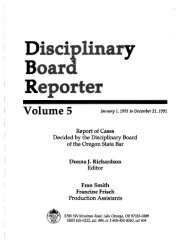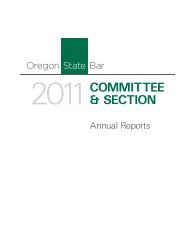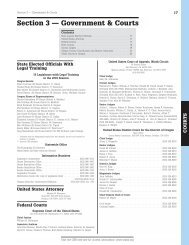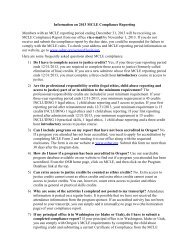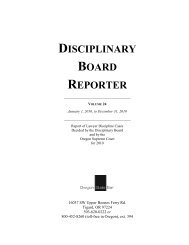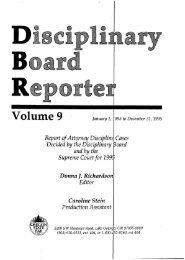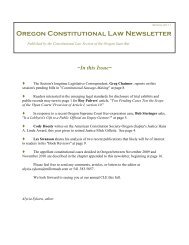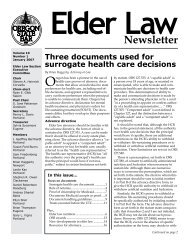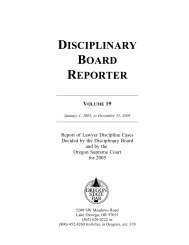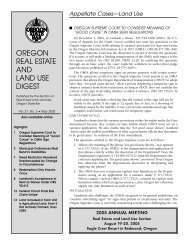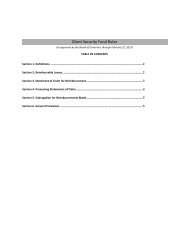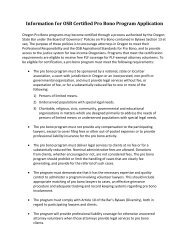February 22, 2013 - Oregon State Bar
February 22, 2013 - Oregon State Bar
February 22, 2013 - Oregon State Bar
Create successful ePaper yourself
Turn your PDF publications into a flip-book with our unique Google optimized e-Paper software.
legal circumstances requires that a potential client take action in less than 30 days (e.g.,<br />
with respect to criminal and traffic law defendants who may well need particularly<br />
prompt assistance), a 30-day blackout cannot be imposed. See, e.g., Ficker v. Curran, 119<br />
F3d 1150 (4 th Cir 1997).<br />
There are still unanswered questions concerning the scope of federal free speech<br />
protection. Some of these questions stem from the fact that under the First Amendment,<br />
commercial speech is entitled to less protection than political speech. See, e.g., Central<br />
Hudson, supra. For example, one can readily assert that under Edenfield v. Fane, a<br />
prohibition on in-person or real-time electronic client solicitation in business matters<br />
would not pass muster—at least absent the kind of study that the Florida <strong>Bar</strong> submitted<br />
on behalf of its 30-day waiting period. The Majority found it unnecessary to reach a<br />
conclusion on this issue as a matter of federal First Amendment law because, in our view,<br />
the state constitutional protection of lawyer speech is clearly greater than the First<br />
Amendment protection.<br />
B. <strong>State</strong> Constitutional Free Speech Protections<br />
Article I, Section 8 of the <strong>Oregon</strong> Constitution, which has been a part of the state<br />
constitution since 1859, provides that:<br />
No law shall be passed restraining the free expression of opinion, or restricting the<br />
right to speak, write, or print freely on any subject whatever; but every person shall be<br />
responsible for the abuse of this right.<br />
A long line of <strong>Oregon</strong> cases has held that the state constitution provides greater<br />
protection to speech than the federal First Amendment. The <strong>Oregon</strong> Supreme Court has<br />
held, for example, that the state constitution protects commercial speech to the same<br />
degree that it protects political speech. See, e.g., Moser v. Frohnmayer, 315 Or 372, 376, 845<br />
P2d 1284 (1993). If, in other words, the state cannot prevent certain kinds of speech by<br />
political actors (e.g., all types and forms of door-to-door or telephone canvassing), it<br />
cannot prevent the same kinds of speech by commercial actors, including but not limited<br />
to lawyers.<br />
The <strong>Oregon</strong> Supreme Court applies its own three step approach to free speech<br />
analysis under Article I, Section 8.<br />
First, the <strong>Oregon</strong> Supreme Court distinguishes between laws that focus on<br />
restricting the content of speech and laws that focus on restricting results or effects of<br />
speech. See, e.g., <strong>State</strong> v. Plowman, 314 Or 157, 163, 838 P2d 558 (1992) (summarizing <strong>State</strong><br />
v. Robertson, 293 Or 402, 649 P2d 569 (1982)). Laws that focus on the content of speech<br />
violate Article I Section 8 unless they fall within a well-established historical exception.<br />
Thus, a content-based restriction is prohibited unless: “the scope of the restraint is wholly<br />
confined within some historical exception that was well established when the first<br />
American guarantees of freedom of expression were adopted and that the guarantees then<br />
or in 1859 demonstrably were not intended to reach. Examples are perjury, solicitation or<br />
verbal assistance in crime, some forms of theft, forgery, and fraud, and their<br />
contemporary variants.” Robertson, supra, 293 Or. at 412. For example, the state was<br />
Report of the Advertising Task Force (August 2009) Page 4



